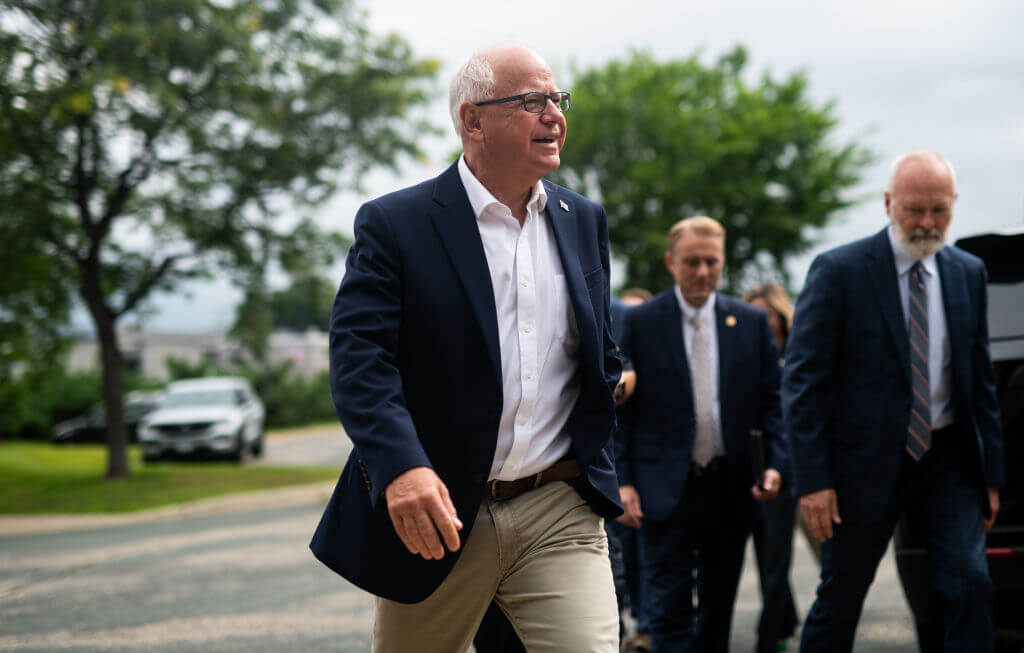VP nominee Tim Walz learned how to be a politician at a progressive boot camp founded by Jews
Wellstone Action, named for late Minnesota Jewish Sen. Paul Wellstone, helped shape the Minnesota governor

Minnesota Governor Tim Walz arrives to speak at a press conference regarding new gun legislation at City Hall on August 1, in Bloomington, Minnesota. Photo by Stephen Maturen/Getty Images
(JTA) — In 2005, a high school geography teacher in rural Mankato, Minnesota arrived at a politics boot camp named for a progressive Jewish senator, where he honed his skills in grassroots organizing and voter outreach.
Nearly two decades later, Tim Walz is the Democratic vice-presidential candidate. And the Jews who trained him couldn’t be happier.
“I’m excited, because he’s a winner,” David Wellstone said about Walz on Tuesday, following his selection. “And he operates with integrity.”
Wellstone, alongside his brother Mark, is the co-founder and former co-chair of Wellstone Action, the progressive training organization named in memory of their father, Minnesota Senator Paul Wellstone. The brothers saw the organization as a way of inculcating their father’s brand of populist progressivism in a new generation of politicians.
Camp Wellstone, the boot camp Walz attended, was designed to teach aspiring leaders in Minnesota and beyond the basics of door-knocking and coalition-building in the space of a few days. Walz immediately stood out, David Wellstone recalled.
“You could tell he was a leader,” he said, adding that the camp worked to mold the teacher into a candidate who could win.
“I would like to think, and I do think, that when Governor Walz went through Camp Wellstone it helped shape the way that he politicked,” Wellstone said. Wellstone believes the camp formed “the way that he connected to people, the way that he listened to people, which is what my dad did.”
Paul Wellstone, who died in a plane crash in 2002 during a reelection campaign, was part of a line of Jewish politicians from the Midwest state who all held the same Senate seat over nearly four decades. He made his name in progressive politics when, as a Carleton College professor, he successfully challenged Jewish Republican incumbent Rudy Boschwitz for the seat in 1990.
In that race, Wellstone was viewed as the underdog — and the fact that he’d married a Baptist caused some controversy, including surrounding mailers sent by Boschwitz supporters that questioned his Jewishness. The tactic didn’t work, David recalled: “The Jewish community in Minnesota rallied around him,” he said.
As a senator, Wellstone was widely viewed as a dedicated progressive who was pro-Israel, positions that, at the time, were not considered to be in tension. He was also a regular contributor to Tikkun, a dovish progressive Jewish magazine. At the time of his death, he was running against another Jewish challenger, Norm Coleman, who succeeded him. Coleman, in turn, lost to Jewish Democrat Al Franken in 2008.
Wellstone Action, founded shortly after Wellstone’s death, became a key stop for many Democrats looking to make inroads in state politics. Other program alums include Minnesota Attorney General Keith Ellison and Lieutenant Governor Peggy Flanagan — who, in fact, trained Walz in 2005 before later becoming his number-two. (If Harris and Walz win in November, Flanagan would become the first Native American female governor in U.S. history.)
The year after he completed the program, Walz became Camp Wellstone’s first successful alum at the federal level when he was elected to Congress. In 2018 he won election to the governorship, nearly six years before Vice President Kamala Harris selected him as her running mate.
David Wellstone has remained close friends with Walz through the intervening years, and said the governor “comes out of the Wellstone mold of how do you run campaigns, which is connecting with people.”
He added that he believes Walz — who beat out Pennsylvania’s Jewish governor, Josh Shapiro, in the veepstakes — would be “eminently fair” on issues of concern to American Jews. Walz has other connections to the state’s Jewish community, and wrote his master’s thesis on Holocaust education.
“While he’s not Jewish, I think he’s a strong supporter,” Wellstone said. “I don’t have any concerns. I know others might, but I don’t. I’m truly excited, and I think he’s going to represent us and progressives very well.”
Today, the program Walz attended looks markedly different — and has fewer Jewish voices. Both Wellstone brothers were ousted from the board during a 2018 shake-up, when they butted heads with the rest of leadership over the direction Wellstone Action should take in the wake of Trump’s election. Among the reported disagreements were David and Mark’s fears that the group had veered too much into identity politics while ignoring the rural white voters who’d nearly handed the state to Trump in 2016.
With no familial connection to the Wellstone legacy, Wellstone Action rebranded as re:power. Today it markets itself as “a Pro-Black organization centering women of color and trans and gender-expansive people of color that is focused on fortifying our organizations and leaders for the big battles that lie ahead of us.” The group’s mission statement describes its intent “to build a liberated multi-racial democracy, free from the oppressive systems of white supremacy and patriarchy.“ A request for comment to re:power was not returned.
Today David Wellstone is the co-founder and CEO of a tech company that makes addiction recovery software; his brother Mark founded a cannabis dispensary in Colorado. He said he had “no idea” what re:power’s priorities are today, adding that he no longer wanted his family name associated with it.
But, he said, Walz’s ascension should be understood as a mark in favor of the grassroots boot camps he had advocated for.
“I’m damn proud that we did the camps and I’m damn proud that I fought to keep them,” he said. “The legacy carries on.”



















